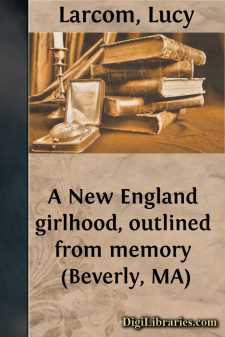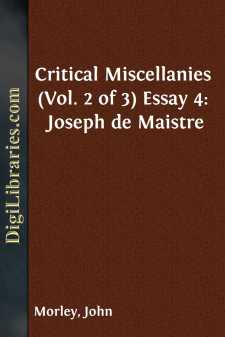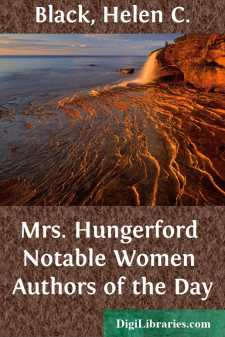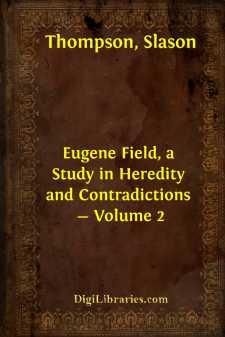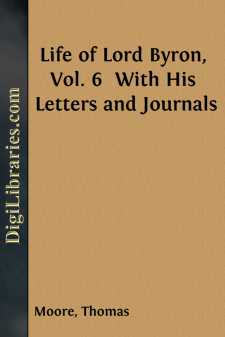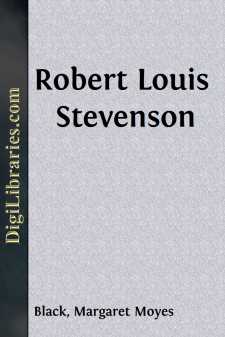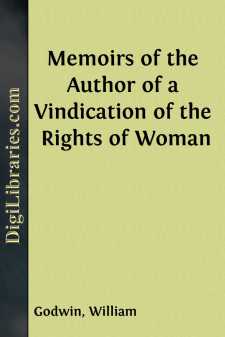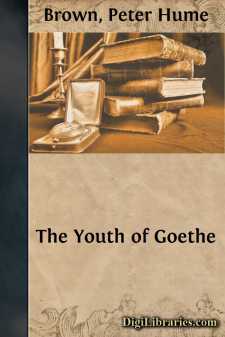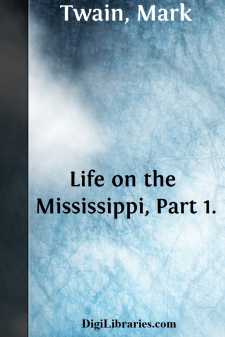Biography & Autobiography
- Adventurers & Explorers 15
- Artists, Architects, Photographers 16
- Business 2
- Composers & Musicians 14
- Criminals & Outlaws 5
- Editors, Journalists, Publishers 6
- Educators 1
- Entertainment & Performing Arts 3
- General 73
- Health, Exercise & Fitness 1
- Historians 3
- Historical 83
- Law Enforcement 1
- Lawyers & Judges 3
- Literary
- Medical 7
- Military 48
- Naturalists, Gardeners, Environmentalists 8
- Personal Memoirs & Diaries 226
- Philosophers 3
- Political 9
- Presidents & Heads of State 38
- Religious 38
- Rich & Famous 27
- Scientists 13
- Women 31
Literary Books
Sort by:
by:
Lucy Larcom
BY THE RIVER. IT did not take us younger ones long to get acquainted with our new home, and to love it. To live beside a river had been to me a child's dream of romance. Rivers, as I pictured them, came down from the mountains, and were born in the clouds. They were bordered by green meadows, and graceful trees leaned over to gaze into their bright mirrors. Our shallow tidal creek was the only...
more...
by:
John Morley
JOSEPH DE MAISTRE. Owing to causes which lie tolerably near the surface, the remarkable Catholic reaction which took place in France at the beginning of the present century, has never received in England the attention that it deserves; not only for its striking interest as an episode in the history of European thought, but also for its peculiarly forcible and complete presentation of those ideas with...
more...
by:
Helen C. Black
It is well worth encountering the perils of the sea, even in the middle of winter, and in the teeth of a north-east wind, if only to experience the absolute comfort and ease with which, in these space-annihilating days, the once-dreaded journey from England to the Emerald Isle can be made. You have resolved to accept a hospitable invitation from Mrs. Hungerford, the well-known author of Molly Bawn,...
more...
by:
Slason Thompson
CHAPTER I OUR PERSONAL RELATIONS In the loving "Memory" which his brother Roswell contributed to the "Sabine Edition" of Eugene Field's "Little Book of Western Verse," he says: "Comradeship was the indispensable factor in my brother's life. It was strong in his youth: it grew to be an imperative necessity in later life. In the theory that it is sometimes good to be...
more...
by:
Thomas Moore
LETTER 508. TO MR. MOORE. "Genoa, February 20. 1823. "My Dear Tom, "I must again refer you to those two letters addressed to you at Passy before I read your speech in Galignani, &c., and which you do not seem to have received.[1] [Footnote 1: I was never lucky enough to recover these two letters, though frequent enquiries were made about them at the French post-office.] "Of Hunt...
more...
CHAPTER I HEREDITY AND ANTECEDENTS'These are thy works, O father, these thy crown,Whether on high the air be pure they shineAlong the yellowing sunset, and all nightAmong the unnumbered stars of God they shine.Or whether fogs arise, and far and wideThe low sea-level drown—each finds a tongue,And all night long the tolling bell resounds.So shine so toll till night be overpast,Till the stars...
more...
by:
William Godwin
CHAP. I. 1759-1775. It has always appeared to me, that to give to the public some account of the life of a person of eminent merit deceased, is a duty incumbent on survivors. It seldom happens that such a person passes through life, without being the subject of thoughtless calumny, or malignant misrepresentation. It cannot happen that the public at large should be on a footing with their intimate...
more...
by:
Peter Hume Brown
PREFACE "Generally speaking," Goethe has himself said, "the most important period in the life of an individual is that of his development—the period which, in my case, breaks off with the detailed narrative of Dichtung und Wahrheit." In reality, as we know, there is no complete breach at any point in the lives of either nations or individuals. But if in the life of Goethe we are to...
more...
THE LIVES OF THE POETS. * * * * * Sir JOHN DENHAM. An eminent poet of the 17th century, was the only son of Sir JohnDenham, knight, of Little Horsley in Essex, and sometime baron of theExchequer in Ireland, and one of the lords justices of that kingdom.He was born in Dublin, in the year 1615[1]; but was brought over fromthence very young, on his father's being made one of the barons of...
more...
by:
Mark Twain
THE Mississippi is well worth reading about. It is not a commonplace river, but on the contrary is in all ways remarkable. Considering the Missouri its main branch, it is the longest river in the world—four thousand three hundred miles. It seems safe to say that it is also the crookedest river in the world, since in one part of its journey it uses up one thousand three hundred miles to cover the same...
more...


